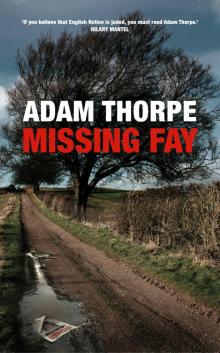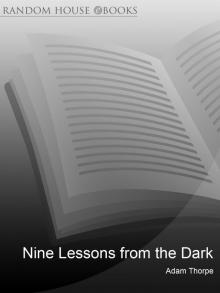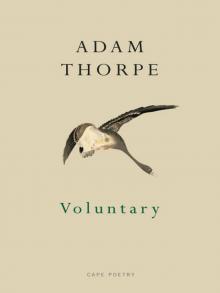- Home
- Adam Thorpe
Between Each Breath Page 23
Between Each Breath Read online
Page 23
He didn’t phone Kaja; in fact, he’d mislaid the number on its little Post-it. Apart from anything else, Monday was the last nail-biting day of the whole test series. He got in takeaways and left half. The victory was peculiar: the umpires dragged out play through fading light until it whimpered and paused and the moment was lost. But Jack still punched the air, all alone, as Michael Vaughan received the tiny urn. Then everything else flooded in. The bad stuff. The stuff that sport kept at bay, most of the time. And music.
Fishing in a drawer, he found his Tallinn souvenir lighter, which had proved so fateful in his life. It still worked. He used it to light the original candle in his antique ceramic lantern, as he’d vowed in the unlikely event of an England win. He watched the early nineteenth-century wax swell and drip as the flame bobbed on the wick, as if about to take off. Was it an early nineteenth-century flame? The smoke was surprisingly thick and black, presumably because of the dust, the two centuries of grime. He closed his eyes and smelt burnt tallow, which was not all that pleasant, and imagined a shadowy, Dickensian room down some soiled backstreet. The smoke seemed to be blackening the ceramic as it rose through the holes in the lantern’s top, so he blew out the flame.
He put on an old vinyl recording of Haydn’s Symphony Number 49 in F minor, La Passione, even though the needle jumped. The work was both tense and sombre enough, that’s why: hammering on in its delicate way, little taps on the heart, mostly very dark. A kind of homeopathy.
He had bad, period dreams in which he was wielding a ceramic bat against all-comers in a tangle of mulberry and quince.
The following day he was in the hospital shop and taking out change for a paper, when someone behind tapped him on the shoulder. It was a man with the liverish, blotched face and sickly smell of the serious cancer sufferer. ‘You’ve dropped this, mate,’ he said. ‘Bound to be the one you want. Always like that with me. Innit? Always the one you want. Eh? The vital bit of paper. Yeah,’ he went on, as Jack was mumbling his thanks, ‘it’s got me in the liver. Ten days, they said. That was six months ago. Blimey. Never say die, eh?’
It was the pink Post-it with Kaja’s number, marked by the imprint of a heel.
Jack was back holding his mother’s hand, her breathing heavy but regular in her sleep, the heart rate pulsing undramatically on the machine, the vital numbers flickering as less vital numbers flickered on screens in the City, when it occurred to him that Moyna might be Jaan’s grandmother.
‘Hiya, gorgeous, you’re looking upset. She’s doing fine, luv! Y’want some cheering up, then just take me out on the town, duck.’
‘I’m fine, thanks, Sue.’
‘Any time, OK?’ she said, winking. It was all a delicious, harmless game, like a rerun of The Liver Birds. ‘You’re luverly. I don’t like ’em tall.’
‘Thanks.’
‘What d’you do, if it’s not a rude question?’
‘I write music.’
Sue’s eyes widened in her friendly, slightly podgy face. ‘What, you’re a rock star, are you? Or just write it down?’
‘Just write it down.’
‘I’ve always wondered about that. Do you hear it first, then, all in one go?’
‘Well, I sort of hear little bits and then glue them together until they make a bigger piece of music.’
‘Just songs, is it? What’s your name again?’
‘Jack Middleton. John to my parents.’
Sue shook her head. ‘No, doesn’t ring a bell. Gimme someone you sound like. Ricky Martin?’
‘It’s not pop or rock, it’s sort of classical. Really hard, modern stuff that no one likes listening to.’
She laughed. ‘I’ll bet it’s really good, anyway. I’m a Liverbird, y’know. A Scouser.’
‘Next door to John Lennon?’
‘No, no idea where they lived, actually. I don’t even bloody like ’em! You make y’living from that, do you? I’ll bet y’mam’s proud of yuz an’ all.’
He shrugged, feeling about fourteen. He wasn’t sure whether she was proud of him. His mother was always saying to him: ‘I don’t care what you do, as long as you’re happy.’ He felt a great love and a great sorrow, watching her sleeping inside her brutal crown.
His father came in to take over. He looked ill with worry and fatigue.
‘How are things?’ he said, blinking at his wife with rheumy eyes. ‘All in order?’
‘Your son’s luverly,’ said Sue. ‘Can I borrow him?’
The line on the machine, panning up and down like a readout of the Himalayas, suddenly looked like Norfolk. The machine’s sympathetic bleep, semiquavers in four-four time, turned into a long sustained note that had Sue glancing up at it. Jack’s heart started to thump as, presumably, his mother’s was not. This is what happened, he thought, in TV soaps. Except that no one was rushing towards his mother and his father was dealing with the stuff he’d brought along in a big Asda bag – a Daily Mail for him to read to her, sucky sweets, a cardboard nail file. Jack did not want to overreact. His mother had opened her eyes – although it made no difference, the darkness was always there.
‘Is it OK?’ Jack asked, his voice tiny and hoarse.
The Himalayas reeled into view again, the bleep returned, the world sang.
‘Funny,’ said Sue, ‘it does that from time to time. I think it needs a good thump.’
He did go back with his father on the Wednesday, to keep him company overnight: Donald was looking very pale. Jack’s sister and brother were planning on flying over the moment things got worse. The critical few days had passed and Jack’s mum was still among them, in better spirits, the heart rate settling down. The doctor announced that she was very pleased.
Each time he went back to the house in Hayes, where he’d been brought up, another layer was added to the layers that separated him from his childhood, because the present house was like a distortion of the place he had known as a boy. The spanking new council estate was now as old as he was, and because a lot of the tenants had bought their houses over the years and added porches or conservatories or long extensions, or in several cases stuck stone cladding on the front, it was a slightly bewildering mishmash.
A sprinkling of takeaway tubs, giant polystyrene cups and several one-litre Smirnoff bottles were tucked into the leylandii hedges bordering the fresh, red-top tarmac; the THIS IS A NEIGHBOURHOOD WATCH sign was already faded, with what looked like gunshot holes in it but were probably kids being adept with a sharp instrument. The overall effect was even less consoling than the stark estate of concrete blocks on Haaremaa where Kaja had been brought up. Bloated-looking kids with shaven heads trailed around on their bikes, just as he had done once, although he wasn’t sure he’d made that much noise or yelled ‘Wa-ank-er!’ at a friend over the road just as a frail old lady was passing.
Some things in his old home hadn’t changed, however: the scuffed fake-leather folder with a very faint, once gilded, Radio Times on its cover, that now held the TV Times; the dented Hovis biscuit tin full of digestives; the smell of peach air-freshener and fatty, toasted things; the hyperrealistic painting of the Alps in the sitting room that he’d once believed was an original, printed as it was on a textured surface.
His little bedroom was now a guest room, although the only guests were his sister or his brother on very occasional visits (about once every three or four years). The room had been newly wallpapered since he’d last seen it, removing the last traces of his boyhood – Blu-Tack scars from posters or quotes from John Cage and Jim Morrison, mainly. The wallpaper was pinstripe pink, rather tasteful, although the overall effect of the revamp still made it feel like a single in a Premier Lodge.
He stood for a moment at the window, which looked down on the little square of lawn and then the rest of the estate, now expanded onto what had been tussocky fields beyond, where he used to play and that had seemed so large and wild. The other gardens were all but hidden by fences, these days, and the silver birch in the corner had grown big enough to block out the
entire right-hand side of the view. It made him feel dark and obscure, as if he was being cheated of his right to see a long way.
His mother had fallen – or thrown herself – out of the room next to this one, which was his parents’ bedroom. He sneaked a look in, as if at something historic. The lace curtains she’d been taking down were still up. He opened the window and looked out. There was a dark stain on the patio. It seemed a very long way down.
His father had been repainting the kitchen cabinets when the accident happened. ‘Crinkly Tan,’ he said, ‘your mum chose it. And the handles.’ He showed Jack a set of porcelain-like knobs decorated with tiny sprigs of flowers, still to be screwed on. Jack offered to do it in the morning. His father looked out of the kitchen window and remarked, ‘It’s quite nice today,’ as if he hadn’t just come in. He must be in a state of shock, Jack thought. His father had always been small and self-effacing, the spit of that actor who’d played the attendant in the stuck lift in that famous Hancock sketch, but now he was even smaller, all but disappearing into the background. When Jack was a boy he’d been confused by the fact that his father was a member of an Airfix Club, making models and meticulously painting them with the more expensive Humbrol range. He spent three years, once, on a balsa-wood model glider which crashed into a cowpat on its maiden flight. Perhaps in reaction, Jack had never made a model in his life.
They sat down to an early dinner of fishcakes, frozen peas and packet mash. Jack had offered to phone for a Chinese takeaway, but his father insisted on cooking. It kept him sane, he said. Despite his mother’s Irish origins (or perhaps because of them), Jack’s parents were lapsed Baptists, and still avoided alcohol except for a few doses of sweet sherry over Christmas. Jack thought it would do him good, not drinking for one day. The portions were small, as neither of his parents had a large appetite. He felt huge in the kitchen, getting the food down too quickly and then surreptitiously scraping at the plate. The newish cat, a tortoise-shell called Minx, sat at his feet and purred, not realising.
‘There’s pudding,’ said his father, whose plate appeared untouched. ‘A bit like Angel Delight. Remember? I know you always liked it. Mango and guano flavour. Or lime and Victoria plum.’
‘Guava. I hope not guano.’
‘That’s it. A new one. Can’t keep up. They’re always changing them round. And I’d got your mother those mints for our anniversary,’ he said, indicating a box on the mantelpiece. ‘She’s hardly touched them.’
‘She’ll have them when she gets out,’ said Jack.
He was sweating, suddenly. The neon light was on, although it was still daylight outside. The kitchen faced north and was always dark. Its wall tiles had been changed when his parents had bought the house from the council; they showed a blowup of the opened, dented cap of a Schweppes bottle over and over again. They were quite daring, he thought; Warhol-like, you could say. There was not a single indication that the house was inhabited by a blind person.
‘I think Mum’s doing really well, Dad.’
‘In the circs,’ replied his father, his mouth receiving a forkful of mash. Jack tried to remember how old he was. Seventy-five or seven or something. The framed Grade Eight certificate with Jack’s name already faded was still slightly askew behind his head. They were still planning to frame the others, presumably. We can’t keep up, his mother would joke.
‘We can but wait,’ said Jack, trying to shake the image of his mother flying out of the window and bouncing off the roof.
‘Nothing else for it.’
A phone went. His father, who was fond of new gadgets, had a cordless that he tended (like his son) to leave lying about in strange places. Now they both tracked it down to the sitting room, under the Radio Times folder, just before the answer-phone broke in. Every call was a potential peal of doom and they were nervous. It was Milly.
‘Hello, my dear!’ said Jack’s father. Jack could hear the faint registers of Milly’s voice, saying all the right things. The sitting room was the width of a pair of outflung arms, fingers bunched: about the size of the stall Richard du Crane’s hunter shuffled in. The whole house, for that matter, would have easily fitted into one of Wadhampton Hall’s Tudor food cupboards. They were due there at the weekend: Jack fancied that idea – fancied a break, a gust of greenness. His father gave him the phone after a few minutes.
‘Hi, Jack,’ Milly said, businesslike after Kendal. ‘I’ve got the latest on Moyna. That’s good news. You’ve got this weird message on the phone.’
‘I have?’
‘Yup. I was listening to the messages and it just came up. It’s this woman who seems to know you. Hang on, I wrote it down. Shit. Can’t find the paper. Something snazzy like Karen or Kristina or maybe Xanthea, even. Sorry. I’m mega knackered. Really awful trains.’
‘OK. I don’t know.’
‘Well, she knows you. She says you’ve got to ring her back as soon as possible. Here it is. Kai-yah. I’ve no bloody memory. Nothing like Xanthea. That’s age. Kai-yah. God knows if I’ve spelt it right.’
‘OK.’ He tried to make his voice sound dull and uninterested, like Dustin Hoffman’s in The Graduate, but his throat had physically constricted. ‘And that’s it? Sorry, the hospital’s got into my throat. Stuffy.’
‘Do you know a Kaiyah?’
He looked up at the ceiling, as if pondering. Polystyrene tiles, like an office. Very inflammable. Toxic. Banned, these days, apparently.
‘I’m trying to think,’ he said. His double bluff faded into extinction like a bad sketch.
‘Estonia?’
‘Estonia?’
‘She said Kaiyah from Estonia. Sounds very romantic.’
‘Ah, they’re all called Kaja,’ Jack said, although he had no idea whether this was true – Kaja was the only Kaja he’d met out there.
‘That’s well pronounced. You mean all the lovely girls Edward keeps going on about?’
‘Does he?’
‘You must be selectively deaf. Do you want her mobile?’
‘Yup.’ He faffed around a bit with a Daily Mail on the coffee table, making paper sound effects, the big inky TERROR chiming with something inside him. ‘OK, found a pen. Go ahead.’
His father was looking at him, puzzled.
‘Do you want a pen?’
‘It’s OK, Dad. Carry on with your pudding. No, just talking to Dad. Go ahead.’
Milly gave him Kaja’s mobile number. He’d really screwed things up, not making contact first. Not going into the attack. Waiting like a pillock. He was blushing, and sweat was tickling the sides of his body, under his shirt. He vaguely mimed writing the digits down with his finger.
‘That’s great,’ he said. ‘God knows what she wants.’
There was a silence. All his creative instincts had vanished. He was left with a bare, hard nub that refused to be embroidered.
‘Maybe she wants you again,’ said Milly, sounding very sad.
‘Mill! Puh-lease! I spent my free time in Estonia, as I told you back then, walking around churches and stuff or visiting bogs. I was not about to have –’ he dropped his voice – ‘an affair.’
He caught himself in the mirror above the electric fire: he looked agonised, almost misshapen.
‘I hope you’re right and not hiding anything from me, Jack.’
‘It’s six years ago. It’s probably some student I chatted to in a museum or something. I mean, I did talk to people.’
‘No need to be aggressive.’
‘I’m not aggressive, I’m just thinking how silly this is.’
Silly: he was using his mum’s words. He was going back in time. He’d be sucking his thumb, next, after the pseudo-Angel Delight.
‘Take care,’ said Milly, after a moment.
‘Yeah, take care, Mill.’
He replaced the upright receiver in its stand, struggling a bit to make it bleep, then stood there for a few moments before taking on the kitchen and his father and the normal eddying of life.
‘I do
like Milly,’ said his father. ‘She’s very thoughtful. It’s not everyone who fits that bill, not by a long chalk.’
‘I agree,’ Jack sighed, not meaning it to be a sigh.
‘Which one?’ his father smiled, displaying the two opened desserts. One was mauve, one was pink, like an interior designer’s mood board. Behind the toaster was a pinned-up leaflet that said: Incontact, Action on Incontinence. Enter the Bladder Zone.
‘I’ll go for either,’ said Jack.
It was dry enough to sit outside, afterwards: the plastic chairs had been tipped against the rain, as they always were, and they sat on the twilit patio with its square of lawn and corner rockery. His father sat with his legs crossed, his flannels riding up to show his bony ankles above the grey socks. Jack and Milly would give them trendy designer stuff for Christmas – steel letter holders from Habitat, suede throws from Prêt à Vivre, white feather lights from Heal’s – but it was never on display, and it was rude to ask. Jack was desperate for a drink, something sharp and strong. The Milly call had made him very nervy, and he kept biting his lip. Someone was operating what sounded like a petrol-driven hedge trimmer.
‘That’s antisocial,’ said Jack. ‘On nice evenings.’
His father nodded. An invisible jet rumbled overhead, the noise fanning out into an intermittent roar that seemed to billow and continue for ages. Minx the cat was sniffing about in the washed-gravel edging.
‘She knows perfectly well it’s not for doings,’ said Donald.
Jack had always found it hard to think of things to say to his father; Donald had almost no small talk, and locked his memories (of the war, say) behind an apparent shyness. He could no longer make Airfix models, he was too trembly, and those he had made with such care over the years had disappeared, too awkward to dust. His life was rolling up and there was little to show for it except those he had helped bring into the world, which was why Jack felt a responsibility in his presence and a corresponding, keener sense of diminishing success. His father said very little, either good or bad, about his son’s music. Now Jack wondered again, as he usually did in Hayes (even when his chattier mother was there), why anyone believed in a future at all.

 Missing Fay
Missing Fay Hodd
Hodd Pieces of Light
Pieces of Light The Standing Pool
The Standing Pool Ulverton
Ulverton Nine Lessons From the Dark
Nine Lessons From the Dark Flight
Flight The Rules of Perspective
The Rules of Perspective From the Neanderthal
From the Neanderthal Is This the Way You Said?
Is This the Way You Said? Still
Still No Telling
No Telling Voluntary
Voluntary Between Each Breath
Between Each Breath